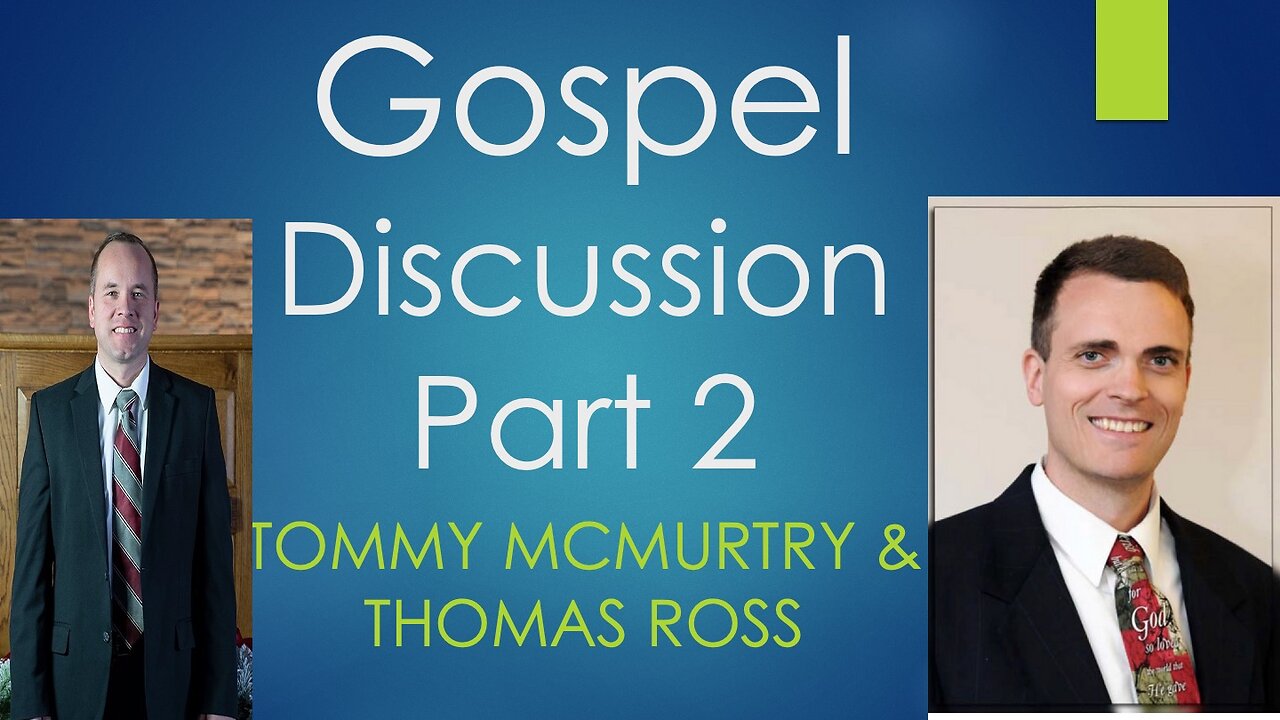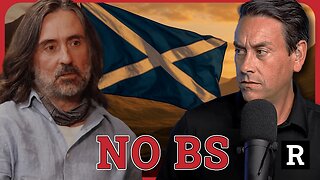Premium Only Content

Tommy McMurtry / Thomas Ross: Baptists Debate Salvation, the Sinner's Prayer, Christ in Hell? part 2
On January 1, 2025, Tommy McMurtry and Thomas Ross held a discussion or a debate in which seven questions were examined:
1.) Does the Old Testament teach that the lost must turn from their sins to be saved?
2.) Does the New Testament teach that the lost must turn from their sins to be saved?
3.) Does one become a disciple at the moment of the new birth, or at some point afterwards?
4.) How does regeneration change someone?
5.) Can people be born again without calling on the Lord / saying the “sinner’s prayer”?
6.) Did Christ suffer in hell after His death on the cross?
7.) How do our beliefs on the issues above impact how we seek to fulfill the Great Commission?
This video is part 2 of 2 of their debate, covering topics 5-7, as well as audience questions from all seven of the topics discussed. Please also watch part 1 of 2 on the FaithSaves website, the KJB1611 YouTube, or the KJBIBLE1611 Rumble channel.
In part 5, McMurtry argued that every lost person does repeat the sinner's prayer-they must call on the Lord in order to be justified. He encourages the lost to repeat the sinner's prayer, and will lead lost sinners to repeat words after him when he "leads them to the Lord." McMurtry argued that Romans 10 teaches the necessity of repeating the sinner's prayer to be born again. As Tommy McMurtry shares the doctrinal beliefs of the "new IFB" movement spearheaded by Steven Anderson (while repudiating Anderson's moral failures), his position is similar to that expressed by Steven Anderson: “Yes, the prayer saves you, if you believe the prayer. ... It is the words that save you [although there can be variety]” (You Must Call Upon the Name of The Lord To Be Saved, sermon by Steven Anderson, December 18, 2017).
In part 6, McMurtry defended the belief (shared with Steven Anderson) that the Lord Jesus Christ was tormented in hell after His death. In part 7, Tommy McMurtry argued that teaching that repentance involves only turning from unbelief (not from sin), separating discipleship from regeneration, his view that the believer receives a sinless spirit but his body or flesh is unchanged, the necessity of the sinner's prayer, and Christ being tortured in hell contribute to a larger amount of evangelism.
In response, Thomas Ross in part 5 argued that nobody ever has been justified, nor ever will be justified, on account of repeating the sinner's prayer-justification is by repentant faith alone. The sinner's prayer did not exist as an evangelistic method for 95% of church history. Revelation 3:20 is not about a lost sinner asking Jesus to come into his heart, but about the Lord Jesus knocking at the door of the church at Laodicea and promising to come in to have fellowship with them if they repent--Christ says he will "come in," "to" them, not come "into" them. Furthermore, confessing Christ with the mouth in Romans 10:9-10 refers to public confession of Christ before men. The passage is not about prayer at all, and certainly not about the lost repeating the sinner's prayer. Also, Romans 10:13 is not about the lost repeating the sinner's prayer; the passage indicates that Christians will be people of prayer. Romans 10:14 proves that calling on the Lord in Romans 10:13 is a mark of the Christian life after coming to saving faith. Both Joel 2:32 and the use of the word "saved" in Romans indicate that future entrance into God's kingdom, not the moment of justification, is in view in Romans 10:13. Joel 2:32 is a verse about born-again Jews in the future Tribulation period calling on God for the second coming of Christ, so they will not be destroyed by the armies of the Antichrist: they are born-again Jews praying "thither cause thy mighty ones to come down, O LORD" (Joel 3:11), not unregenerate people repeating the sinner's prayer. Paul does not take Joel 2:32 out of context in Romans 10:13. Furthermore, the sinner's prayer is absent from all Baptist confessions.
In part 6, Ross argued that the Lord Jesus Christ's human body went to the grave, while His immaterial soul went to Paradise to be with the Father. Neither the Hebrew word Sheol, nor the Greek word Hades, nor the English word hell indicate that Christ was tortured after His death. He pointed out that Baptists and their confessions have viewed the idea that the Lord Jesus suffered torment after His death as blasphemy and heresy. Historically, the clause "he descended into hell" was introduced into the Apostles Creed under Arian influence many centuries after the Apostles.
In part 7, Ross challenged listeners to call on the lost to turn from their sins when preaching the gospel. The lost must be told to submit to Christ as King and Lord, but they should not be told to repeat the sinner's prayer, which confuses the gospel and Biblical assurance. Jack Hyles and Steven Anderson have introduced error.
Note: Once in a cross-ex Ross erroneously said that Christ's human nature was omnipresent. He misspoke--he meant to say "Divine nature" not "human nature."
-
 7:53:48
7:53:48
Dr Disrespect
9 hours ago🔴LIVE - DR DISRESPECT - WARZONE - RAGE ON THE MAIN STAGE
158K20 -
 15:26
15:26
ColdBeer
14 hours agoTop 15 Best Games like FALLOUT 4! 2025 Edition
3.42K -
 LIVE
LIVE
LIVE WITH CHRIS'WORLD
9 hours agoLIVE WITH CHRIS’WORLD - Deals & Drama | Here’s The Truth
89 watching -
 48:25
48:25
Donald Trump Jr.
4 hours agoLawless Lawfare and the Meme Wars. Interviews with Alex Swoyer & Doug Mackey | TRIGGERED Ep.262
103K32 -
 59:01
59:01
BonginoReport
4 hours agoSydney Sweeney Makes America Hot Again & Triggers The Libs! - Hayley Caronia (Ep.99)
52.4K34 -
 53:29
53:29
Candace Show Podcast
5 hours agoEXCLUSIVE! Brigitte Macron's Lawyer Has A Dark Past. Dan Bongino Speaks Out. | Candace Ep 220
74.7K142 -
 26:02
26:02
Athlete & Artist Show
8 hours ago $0.51 earnedHappy Gilmore 2, Was 30 Years Worth The Wait?!
13.4K2 -
 5:44
5:44
China Uncensored
10 hours agoYou DO NOT Want To Go To China
13.7K27 -
 1:38:54
1:38:54
The Mike Schwartz Show
4 hours agoTHE MIKE SCHWARTZ SHOW Evening Edition 07-28-2025
13.3K3 -
 1:18:11
1:18:11
Redacted News
5 hours agoScotland is being DESTROYED and Neil Oliver is trying to save it
59.6K78